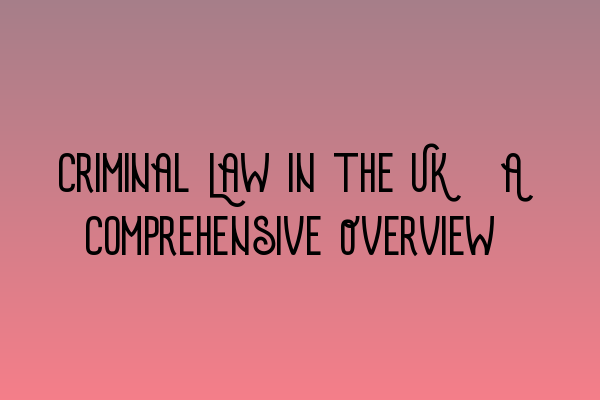Criminal Law in the UK: A Comprehensive Overview
As one of the fundamental branches of legal practice, criminal law plays a crucial role in maintaining social order and justice in the United Kingdom. Understanding the intricacies of criminal law is vital for legal professionals, including solicitors, in their pursuit of justice. In this comprehensive overview, we will delve into the core principles, procedures, and key aspects of criminal law in the UK.
Overview of Criminal Law
Criminal law encompasses the body of laws that relate to crime, defining criminal offenses, prescribing punishments for those offenses, and outlining the procedural steps involved in the criminal justice system. The law sets a standard of conduct and imposes penalties for individuals who violate those standards. It is instrumental in safeguarding the rights of both the accused and the victim.
Key Elements of Criminal Law
Understanding the key elements of criminal law is crucial to navigate the complex legal landscape. The following elements form the foundations:
- Actus Reus: The physical act or conduct that constitutes a crime. It establishes that a criminal act has occurred.
- Mens Rea: The mental state or intention required to commit an offense. It ensures that the individual possessed the requisite culpability or guilty mind.
- Causation: The link or connection between the accused’s conduct and the resulting harm or consequences.
- Strict Liability: Certain offenses do not require the proof of intent or guilty mind, making individuals responsible regardless of their mental state.
Criminal Law Procedures
The criminal justice system in the UK follows a well-defined set of procedures to ensure fairness and due process. The following are the key steps involved in criminal law procedures:
- Investigation: Gathering evidence, conducting interviews, and collecting forensic data is essential to determine whether a crime has been committed and identify potential suspects.
- Arrest: If there is sufficient evidence to suggest that an individual has committed a crime, they can be arrested, and their rights must be protected during the process.
- Charge: The accused is formally charged with a criminal offense, and the charges are presented before the court.
- Bail: In some cases, individuals can be released on bail while awaiting trial, under certain conditions to ensure their appearance in court.
- Arraignment: The accused enters a plea of guilty or not guilty in response to the charges presented.
- Trial: The process of presenting evidence, examining witnesses, and allowing both the prosecution and defense to present their case before an impartial judge or jury.
- Verdict: The judge or jury evaluates the evidence and reaches a verdict of guilty or not guilty.
- Sentencing: If found guilty, the court determines an appropriate punishment based on the severity of the offense.
- Appeal: In certain circumstances, the convicted individual can appeal against the verdict or sentence.
Relevant SQE Preparation Courses and Exam Dates
To prepare for the SQE 1 and SQE 2 exams, it is essential to have a comprehensive understanding of criminal law. Consider enrolling in SQE 1 and SQE 2 preparation courses to enhance your knowledge and increase your chances of success. Additionally, practicing with exam questions and mocks can help familiarize yourself with the examination format and identify areas that require further attention.
For SQE 1 practice exam questions, visit our SQE 1 Practice Exam Questions page. To access SQE 1 practice mocks, including FLK1 and FLK2, check out our SQE 1 Practice Mocks FLK1 FLK2 page.
For comprehensive SQE 2 preparation courses, browse through our offerings on our SQE 2 Preparation Courses page. We also offer SQE 1 preparation courses to help you excel in the initial qualification examination. Stay updated with the latest SRA SQE Exam Dates to plan your preparation effectively.
Conclusion
Criminal law forms an integral part of the legal system in the UK, ensuring the fair administration of justice. Understanding its principles, procedures, and key elements is essential for legal professionals and aspiring solicitors. By enrolling in comprehensive SQE preparation courses and practicing with exam questions and mocks, you can enhance your knowledge and increase your chances of success in the SQE 1 and SQE 2 exams. Stay updated with the latest SRA SQE exam dates to plan your preparation effectively.
